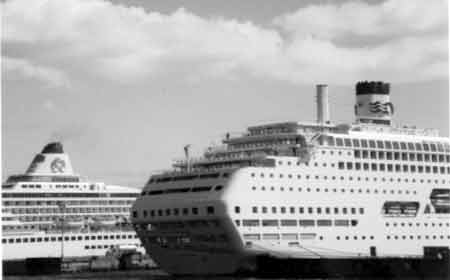DominionSections
Browse Articles
- IndependentMedia.ca
- MostlyWater.org
- Seven Oaks
- BASICS Newsletter
- Siafu
- Briarpatch Magazine
- The Leveller
- Groundwire
- Redwire Magazine
- Canadian Dimension
- CKDU News Collective
- Common Ground
- Shunpiking Magazine
- The Real News
- Our Times
- À babord !
- Blackfly Magazine
- Guerilla News Network
- The Other Side
- The Sunday Independent
- Vive le Canada
- Elements
- ACTivist Magazine
- The Tyee
- TML Daily
- New Socialist
- Relay (Socialist Project)
- Socialist Worker
- Socialist Action
- Rabble.ca
- Straight Goods
- Alternatives Journal
- This Magazine
- Dialogue Magazine
- Orato
- Rebel Youth
- NB Media Co-op
Radio
Cruise Control?
July 20, 2004
Cruise Control?

What images spring to mind when you imagine a northern cruise vacation? Crystal clear water, teaming with sea life; humpback whales, porpoise and dolphin frolicking for your viewing pleasure; or perhaps just the vastness of a clean, wild ocean untouched by human pollution. These images contradict the current reality of the cruise industry.
A single cruise ship discharges approximately 1.3 million litres of waste water per day, more than the port city of Haines, Alaska. Haines can expect several ships per day, creating a floating mega-city in the harbour. NGOs concerned about cruise ship pollution have found that cruise ships burn fuel that has a 90% higher sulphur content than that used by cars. An American environmental group, the Blue Water Network, estimates that 77% of all ship waste comes from cruise ships. About two billion pounds of trash is dumped into the world's oceans each year and 24% of that waste comes from cruise ships. Approximately 14 million kilograms of waste was produced in 2000 on the Alaska-Canada route. With the exception of plastics, most of this waste can be ground up and legally dumped.
Even more disturbing is the nature of some of the environmental violations, companies purposely and systematically polluting throughout their fleet. The Royal Caribbean Cruises Incorporated and Norwegian Cruise Lines were caught having installed lines to bypass the oil/water separator, a mechanism used to clean water of oil before being discharged. These lines were removed during US coast guard inspections to avoid detection. Both of these companies were also found guilty for dumping purposely hazardous waste into their waste water. Ironically RCCI was promoting its "Save the Waves" campaign while purposely and illegally polluting our oceans. Carnival Corporation Limited also had to pay for dumping oily waste from 5 ships, and making false entries into their log books.
There is a serious need to strengthen environmental regulations that govern cruise ships. Linda Nowlan, of West Coast Environmental Law, points to one area of weakness, "A ship that sails from Seattle to Alaska can't dump sewage in Washington's waters and it can't dump in Alaskan waters. But it can dump raw sewage for most of the thousand kilometres it travels in BC."
Most of the ships that ply through Canadian waters are also flying "flags of convenience". Companies register vessels in countries that charge little or no tax and turn a blind eye to international conventions on marine safety, the environment and labour standards. Some nations that offer flags of convenience include Panama, Burma, Cambodia, Lebanon, the Bahamas and Liberia. Liberia gains $15-20 million per year for its registered cruise ships and allegedly uses this to support brutal rebel groups in neighbouring Sierra Leone.
Canada has recently ratified the Kyoto Protocol, yet a loophole benefiting cruise ships has emerged. Greenhouse gas emissions of international ships are excluded from the national emissions inventories. Bunker fuel emissions of commercial vessels (whether registered as domestic or foreign-flagged), like airplanes, whose "point of departure or point of destination" is outside territorial waters, will find their emissions are not counted.
Over the last three years there has been a 300 percent increase in cruise ship traffic in Victoria, British Columbia. The cumulative impact of this year's 320 000 passengers and crew members from almost 160 visits has not been studied or planned for in Victoria despite the fact that the cruise port resides in a residential neighbourhood, with massive ships less than 300 metres away from the front-steps of people's homes.
Local citizen's groups have begun to take action on the issue of cruise ships. In a report titled Ripple Effect, the Vancouver Island Public Research Group (VIPIRG) is calling for a public assessment of the cruise ship industry, in particular relating to impacts on the environment, and the community.
For more information, read Vancouver Island Public Interest Research Group's report, Ripple Effects: The Need to Assess the Impacts of Cruise Ships in Victoria B.C.
Related articles:
By the same author:
Archived Site
The Dominion is a monthly paper published by an incipient network of independent journalists in Canada. It aims to provide accurate, critical coverage that is accountable to its readers and the subjects it tackles. Taking its name from Canada's official status as both a colony and a colonial force, the Dominion examines politics, culture and daily life with a view to understanding the exercise of power.